Works of Hegel (13 vols.)
Digital Logos Edition
Overview
Hegel’s impact on western philosophy can be seen as much in those who disagree with him as in those who agree. Karl Marx, an enthusiastic student of Hegel’s works, developed his economic theory based on Hegel’s dialectic understanding of reality. Kierkegaard’s existentialism owes as much to Hegel as it does to Kierkegaard’s rejection of him. Feuerbach, too, had strong affinities and objections to Hegel’s ideas. Whether you agree or disagree with Hegel, he is a force to be reckoned with, and his works are a necessity in any philosophical library.
Select Works of Hegel contains all of Hegel’s major philosophical works and a number of important lectures. The texts are completely indexed and tagged, allowing you to get near-instant search results and quickly cross-reference books. References to other works link to those texts in your library, allowing you to see a reference in context with a click. You can look up difficult words with the dictionary lookup tool.
This title is included in the following collections
You can save when you purchase this product as part of a collection.
Modern Philosophy Research Lib...
$499.99$499.99Philosophy Research Library (1...
$799.99$799.99Logos 8 Lutheran Diamond Legac...
$2,999.99$2,999.99Logos 9 Lutheran Diamond Legac...
$2,999.99$2,999.99
- $4,749.99$3,562.49
- $4,749.99
- $4,749.99
- $4,749.99
- $4,749.99
- $23,999.99$17,999.99
- $21,749.99
- $24,999.99

- In-depth indexes
- All of Hegel’s major philosophical works
- Introductions and explanatory notes by the translators
- Title: Works of Hegel
- Volumes: 13
- Pages: 5,314
- Resource Type: Collected Works
- Topic: Continental Philosophy
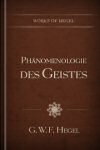
Phänomenologie des Geistes is in German.
Phänomenologie des Geistes, translated as “phenomenology of mind” or “phenomenology of spirit,” is Hegel’s most important work. In Phänomenologie, Hegel lays out the core arguments for his whole system of theology. Originally titled Science of the Experience of Consciousness, the book takes the reader on a journey through the evolution of consciousness. Hegel argues that when the consciousness examines itself, it reveals that what appear to be fixed ideas are actually dynamic states of consciousness. The consciousness is always improving its knowledge of the objects it studies. The mind recognizes that there is a gap between its perception of a thing and the thing itself. In its attempt to close this gap, the mind modifies both its perception and what it believes to be the thing itself. The mind then takes that modified perception, notices differences between that and reality itself, and the cycle continues. Hegel argued that philosophy advances by following this process, rather than following deductive reasoning. The process—often called the Hegelian dialectic—is the foundation of Hegel’s subsequent philosophy.
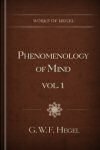
Phenomenology of Mind, vol. 1 is the English translation of the first part of Phänomenologie des Geistes.
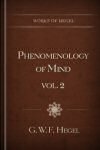
Phenomenology of Mind, vol. 2 is the English translation of the second part of Phänomenologie des Geistes.

The Logic of Hegel contains the first part of Hegel’s Encyclopedia of the Philosophical Sciences in Outline, The Science of Logic, and an introduction and explanatory notes by translator William Wallace. Hegel created this as a shortened version of his larger work of the same name to be used as the basis for a course in philosophy. In this work, Hegel argues, following and adapting Kant, that the mind shapes reality. Going beyond Kant, Hegel argues that the logical conclusion of this proposition is that mind and reality share the same structures. Consequently, reality is much more like an idea than a thing.
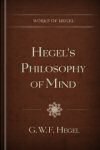
Hegel’s Philosophy of Mind contains William Wallace’s English translation of Hegel’s shortened version of Phenomenology of Mind for the Encyclopedia of the Philosophical Sciences in Outline. The argument largely follows the same lines as Phenomenology, with some alteration. As with The Science of Logic, the work is in outline form with a view to use in the classroom. Also included in this work are five introductory lectures by Wallace.
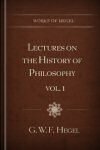
In Lectures on the History of Philosophy, Hegel looks at the history of philosophy through his own dialectical theory of the evolution of consciousness. Volume one contains introductory lectures as well as lectures on Oriental philosophy, Indian philosophy, and the beginning of Greek philosophy.
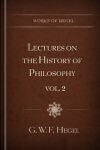
In Lectures on the History of Philosophy, Hegel looks at the history of philosophy through his own dialectical theory of the evolution of consciousness. Volume two contains the rest of the lectures on Greek philosophy, ending with the Neo-Platonists.
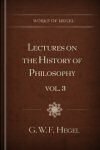
In Lectures on the History of Philosophy, Hegel looks at the history of philosophy through his own dialectical theory of the evolution of consciousness. Volume three begins with the Church Fathers and ends with Kant, Fichte, and Schelling.

In Lectures on the Philosophy of History, Hegel seeks to interpret the whole scope of history through his dialectical method. “World history,” says Hegel, “represents the development of the spirit’s consciousness of its own freedom and of the consequent realization of this freedom.” He argues that all of history follows the development of reason; it is the outworking of the absolute spirit’s discovery of its own consciousness. Published posthumously, the work is a compilation of notes from a series of lectures given at the University of Berlin between 1821 and 1831.

Hegel’s Philosophy of Right contains S.W. Dyde’s English translation of Elements of the Philosophy of Right. This work is Hegel’s complete and mature theory of the state. Hegel argues that individual free will only realizes itself, realizes complete freedom, through its interactions with the various aspects of the life of the state (property rights, contracts, moral commitments, family life, economy). He argues that individual states are subsumed within the grand scope of world history. Following his dialectic, Hegel argues that states rise, conflict with other states, and eventually fall, only for other states to arise. Hegel argues that this dialectical process would lead to increasing personal freedom.
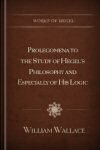
Prolegomena to the Study of Hegel’s Philosophy and Especially of His Logic is an introduction to Hegel’s thought by William Wallace. Wallace translated Hegel’s The Science of Logic and Philosophy of Mind.
William Wallace(1844–1897) was born in Fife. He attended St. Andrews University and Balliol College, Oxford. He became a fellow of Merton College, Oxford, in 1872 and White’s professor of moral philosophy in 1882.

Hegel is a biographical introduction to Hegel’s life and thought by the Scottish philosopher Edward Caird.
Edward Caird (1835–1908) was born in Renfrewshire, Scotland, to the engineer John Caird. He attended the University of Glasgow and the University of Oxford. He became a fellow of Merton College and, in 1866, was appointed to the chair of moral philosophy at Glasgow. In 1893, he became master of Balliol College, Oxford.
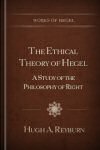
The Ethical Theory of Hegel: A Study of the Philosophy of Right is an overview and explanation of Hegel’s major ideas, particularly related to the philosophy of right.
Hugh Reyburn (1886–1950) was the professor of logic and psychology at the University of Cape Town.
Georg Wilhelm Friedrich Hegel (1770–1831) was born in Stuttgart, Germany. He received his early education at the Gymnasium Illustre in Stuttgart. He entered the seminary at the University of Tubingen in 1788, graduating with a degree in theology. After graduating, Hegel tutored the children of an aristocratic family in Berlin. He left Berlin to lecture on logic and metaphysics at the university in Jena, becoming an Extraordinary Professor in 1805. Displaced by Napoleon’s campaign through Prussia, Hegel took the position of editor at a newspaper in Bamberg. In 1808, Hegel left Bamberg to become headmaster of a gymnasium in Nuremberg. In 1811, he married Marie Helena Susanna von Tucher, with whom he had two sons. Hegel briefly accepted a post at the University of Heidelberg before accepting the chair of philosophy at the University of Berlin, where he remained until his death.
Reviews
4 ratings

Scott J Sherwood
5/23/2016

Charles Puskas
4/19/2015

Michael Mullen
2/20/2014
Albert Cooper
2/7/2014